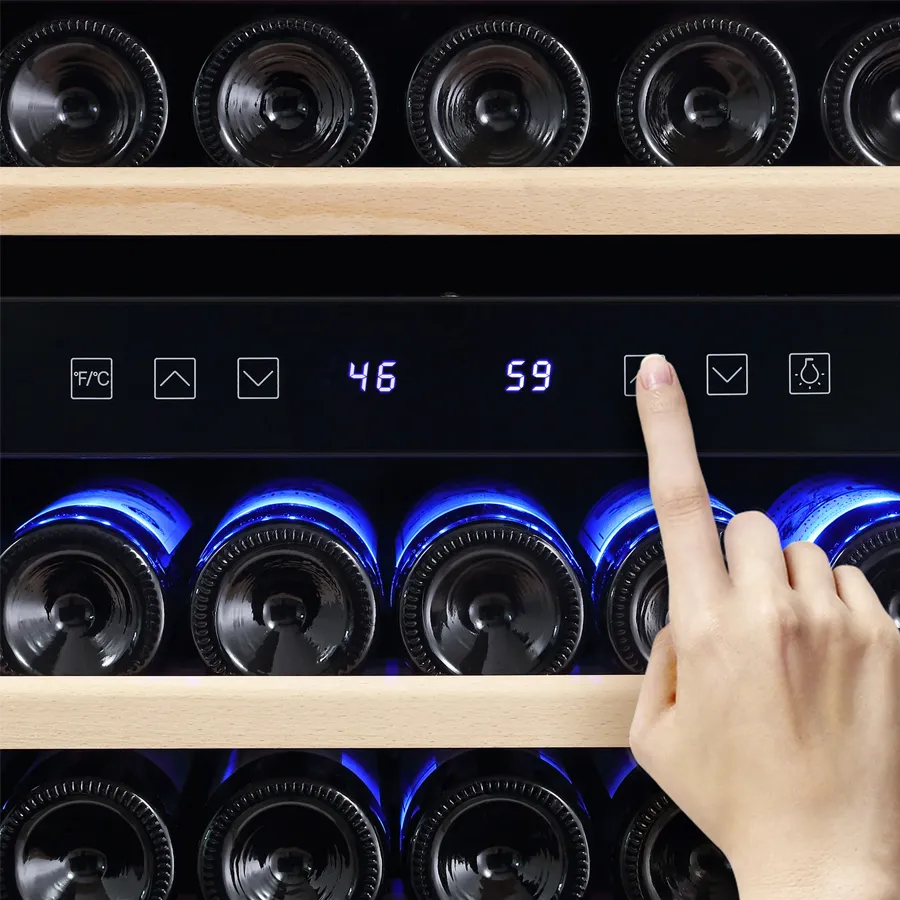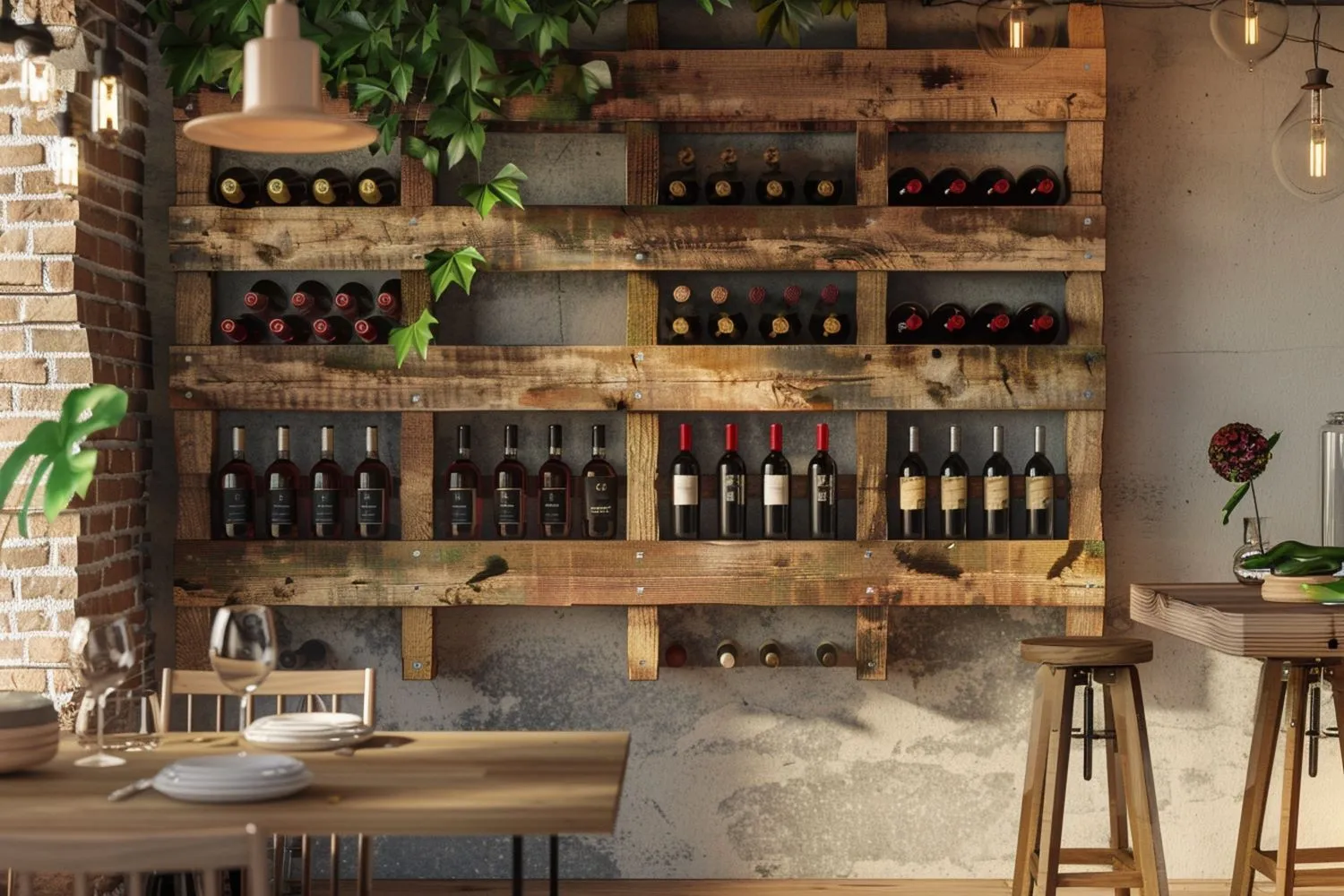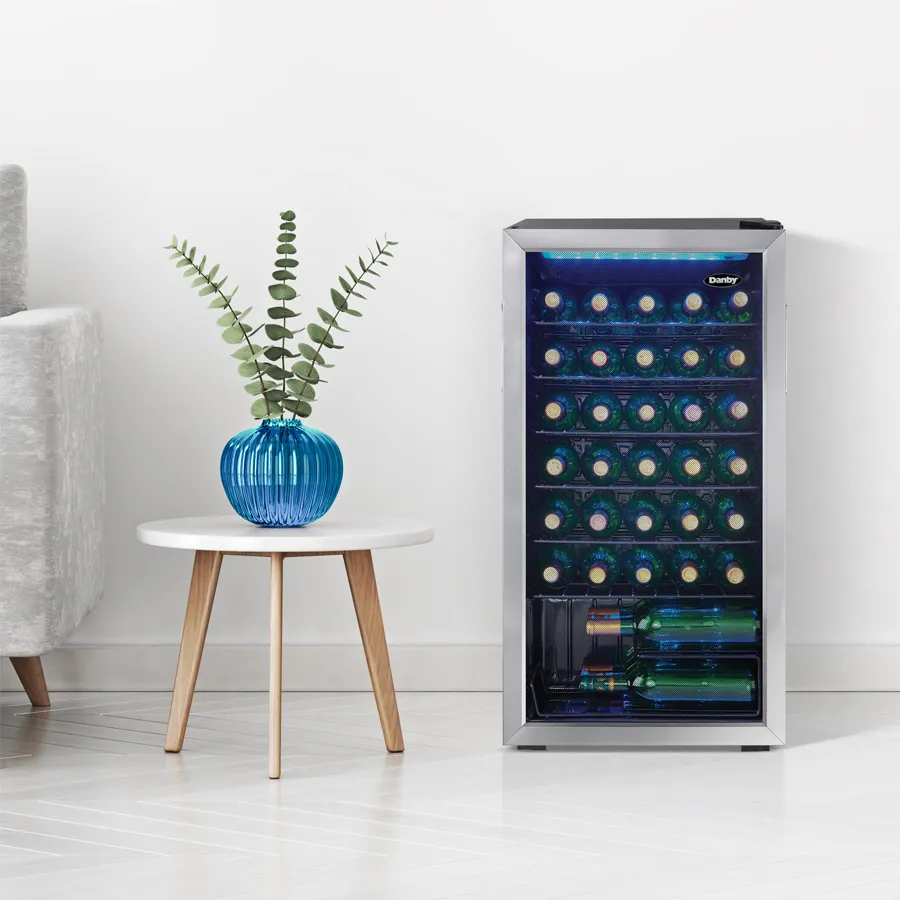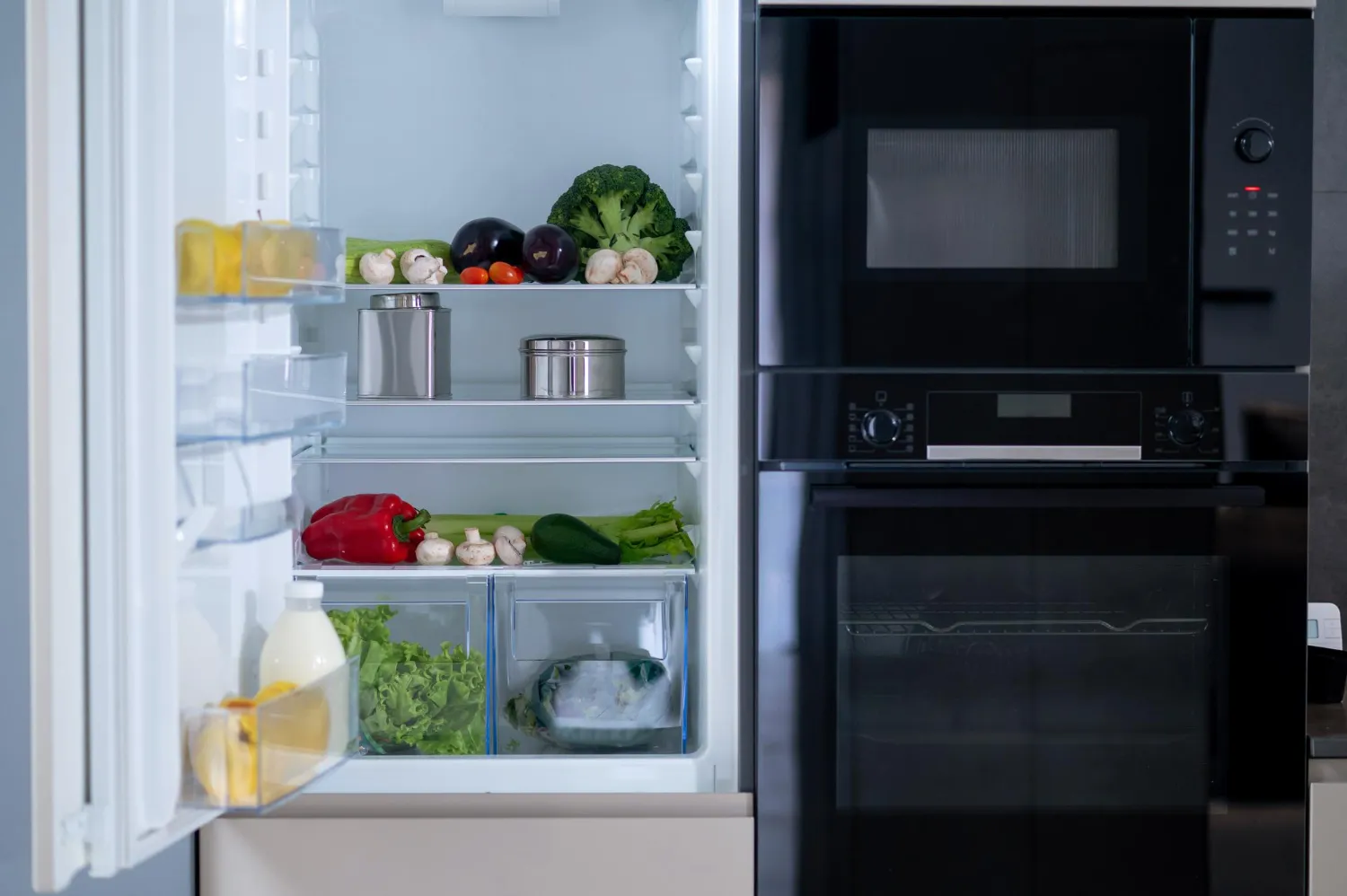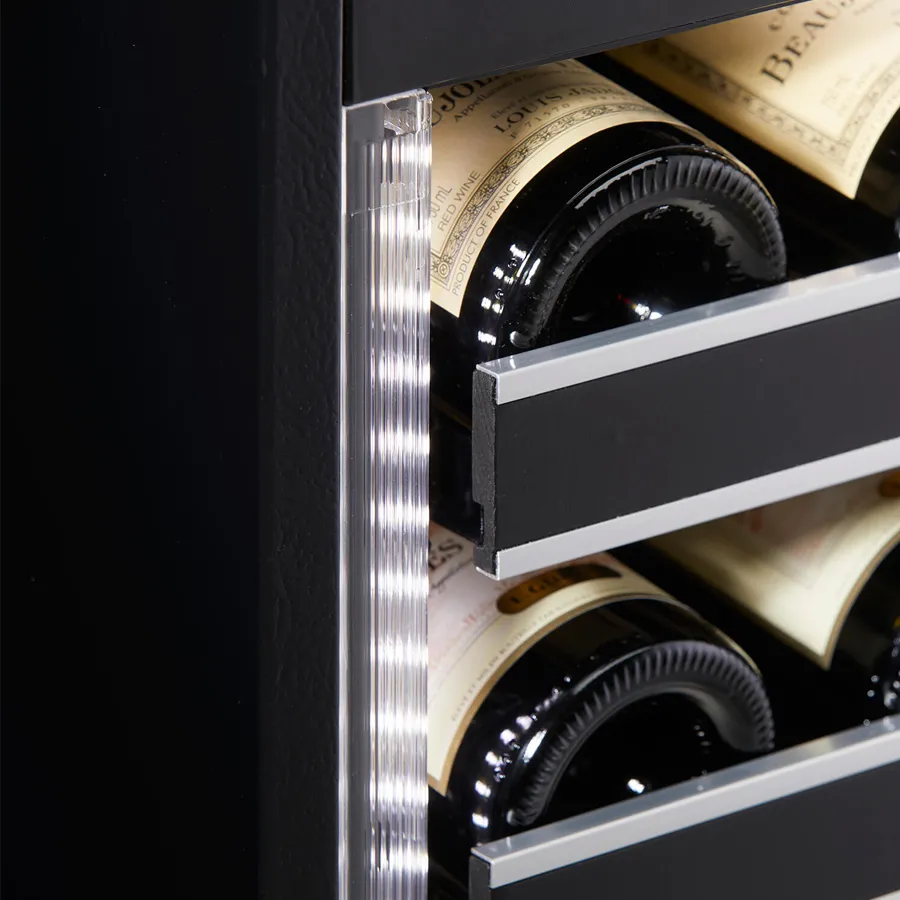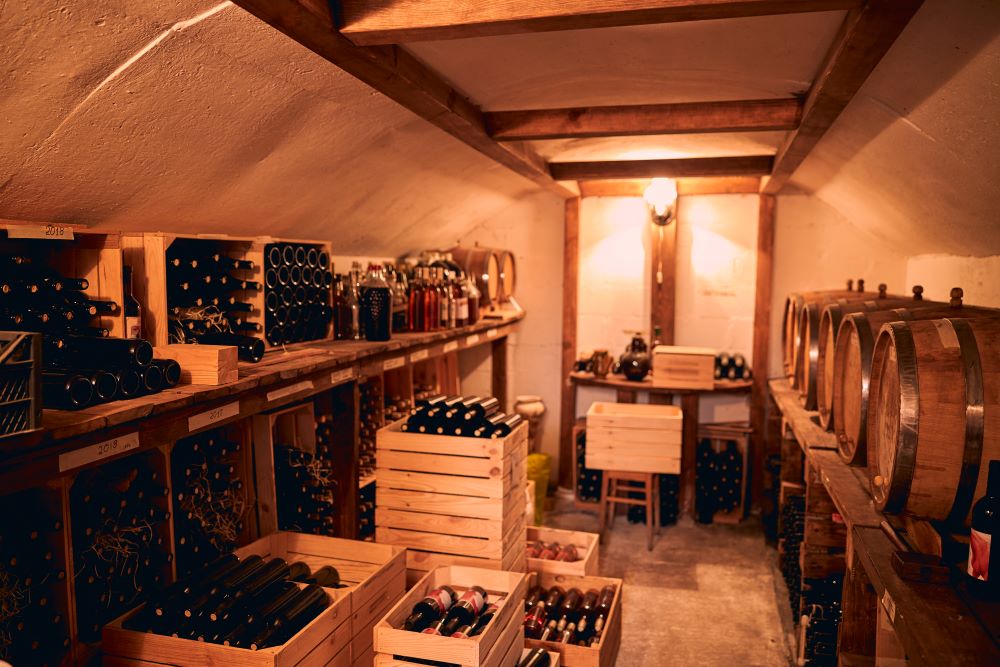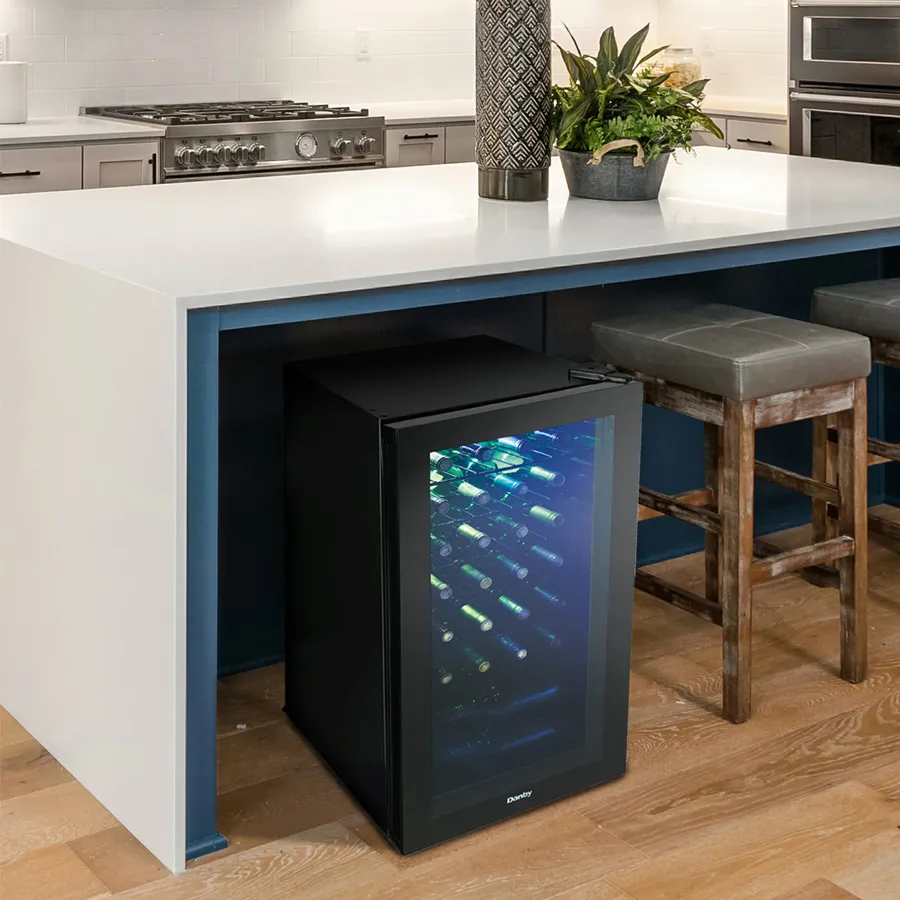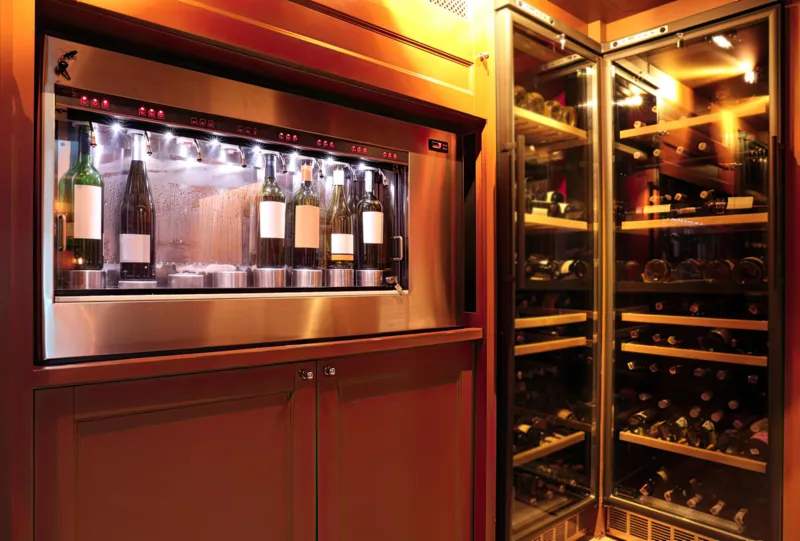Are you trying to select between a compressor wine cooler and a thermoelectric wine cooler? If you’re having trouble deciding how to store your wine, don’t panic; we have some suggestions. If you want to find the best wine cooler for your collection, you need to weigh the benefits and drawbacks of both compressor and thermoelectric models.
About Compressor Wine Cooler:
A compressor wine cooler refrigerator is distinguished most noticeably by its unique cooling system. It uses a compressor to regulate the internal temperature of the cooler in the same way that a standard refrigerator does. This compressor-driven system provides reliable cooling, keeping your wine collection at just the right temperature. If you are looking for a wine cooler that offers powerful cooling capabilities and can handle a larger storage capacity, a compressor wine cooler might be the right choice for you.
=> Read More: How Exactly Does a Compressor Wine Cooler Refrigerator Work?
Because of compressor units, similar to your regular fridge, require refrigerant. They are more durable than thermoelectric wine coolers, can withstand higher ambient temperatures, and can dip down to lower temperatures (ideal for storing very cold white wine). Compressor units, on the other hand, aren’t always as light or silent as thermoelectric ones.

The distinctive cooling system of a compressor wine cooler refrigerator is its most striking feature. Similar to how a regular refrigerator controls the temperature inside, this cooler makes use of a compressor.
About Thermoelectric Wine Cooler:
A thermoelectric wine cooler refrigerator uses special thermoelectric cooling technology to maintain the ideal temperature for storing your wine. The working principle of a thermoelectric wine cooler is based on the Peltier effect, which is a phenomenon discovered by a French physicist named Jean Charles Athanase Peltier. This effect occurs when an electric current flows through two types of semiconductors, creating a temperature difference between them.
=> Read More: How a Thermoelectric Wine Cooler Refrigerator Works?
Thermoelectric units are ideal for apartments or smaller homes due to their low noise and high efficiency. Although they are ideal for short-term storage and will keep your wine safe, they require a fair amount of space and might not work so well in warmer ambient temperatures.

A refrigerator with a thermoelectric wine cooler uses specialized thermoelectric cooling technology to keep your wine at the perfect serving temperature.
Main Comparisons and Contrasts Between Compressor vs Thermoelectric
Despite both compressor and thermoelectric wine coolers being popular options for wine enthusiasts, they have their own set of differences and similarities. Here is a breakdown of the main comparisons and contrasts between the two:
Compressor wine cooler versus thermoelectric
| Compressor Wine Cooler | Thermoelectric Wine Cooler |
| Noisier | Runs silently |
| More powerful cooling capability | Quieter operation |
| Can handle wider temperature ranges | Uses less energy |
| Prone to vibrations | Gentler on the wine |
There are a few things to think about when deciding between a compressor wine cooler and a thermoelectric wine cooler. If you have a large wine collection or need to store wines at varying temperatures, a compressor wine cooler is your best bet. The downside is that it’s usually louder and can shake up the sediment in your wine. Thermoelectric wine coolers are more kind on the wine and run more silently than compressor coolers, although they may not be as strong. Your final decision should be based on the quantity of your collection and your tolerance for background noise.
Summary of pros and cons between them
When weighing the pros and cons of compressor and thermoelectric wine coolers, it’s important to consider the specific needs of your wine collection. Here is a summary of the main advantages and disadvantages of both types:
| Compressor Wine Cooler | Thermoelectric Wine Cooler |
| Powerful cooling capability | Quieter operation |
| Handles wider temperature ranges | Gentler on the wine |
| Noisier | May not be as powerful |
| Prone to vibrations | Uses less energy |
Personal experiences and anecdotes
Personal experiences and anecdotes from fellow wine enthusiasts can be valuable when deciding between a compressor and a thermoelectric wine cooler. Some people might like a compressor wine cooler because of its strong cooling capacity, while others could favor a thermoelectric wine cooler because of its quiet and gentle functioning. In the end, you should select a wine rack that suits both your tastes and the necessities of your collection.
Noise and Vibration Factors
Factors that may affect your decision include the noise and vibration produced by the wine cooler. Compressor wine coolers are known to produce more noise and vibration, which can be disruptive and potentially affect the quality of your wine over time. Thermoelectric wine coolers, on the other hand, are generally quieter and produce minimal vibration, making them a better choice for those who are sensitive to these factors.
- Noise and vibration levels
- Potential impact on wine quality
- Sensitivity of user
Consistency in temperature is also key, as temperature fluctuations in a wine cooler can impact the aging and overall quality of the wine stored within it.
Cost Analysis and Value
Compressor wine coolers tend to have a lower initial purchase price but may incur higher operating costs over time. Conversely, while thermoelectric wine coolers may have a higher initial cost, they are often more energy-efficient and can result in lower long-term operating expenses.
Space and Capacity Factors
Considering the available space and the number of wine bottles you plan to store is essential when choosing between a compressor and thermoelectric wine coolers. Compressor wine coolers are typically larger and have a higher capacity, making them suitable for larger collections and commercial use. Thermoelectric wine coolers, on the other hand, are more compact and ideal for smaller spaces or personal use.
Assessing Energy Consumption
Assessing the capacity and energy consumption of a wine cooler is crucial in determining its long-term cost and environmental impact. Compressor wine coolers generally have a higher cooling capacity and can maintain consistent temperatures in a wider range, but they consume more energy. Thermoelectric wine coolers are more energy-efficient and environmentally friendly, making them a preferable choice for those concerned about energy consumption.
Whether you opt for a thermoelectric or a compressor wine cooler relies on your own preferences and needs. A thermoelectric cooler could be the best choice if you’re seeking for a more eco-friendly, silent, and vibration-free cooling solution. However, a compressor cooler may be the preferable option if you need a cooler that can adapt to wider temperature swings while still providing steady cooling. You may choose the ideal wine cooler for your needs by thinking about things like available space, cost, and the wines you intend to store.
FAQ About Compressor vs Thermoelectric Winecooler
In Short, What is the difference between a compressor and a thermoelectric wine cooler?
Compressor wine coolers use a compressor and refrigerant to cool the interior, whereas thermoelectric wine coolers utilize thermoelectric technology to create a temperature differential and cool the interior.
Which type of wine cooler is more energy efficient?
Thermoelectric wine coolers are typically more energy efficient than compressor wine coolers, as they do not require a compressor to operate.
Does the cooling method impact the noise level of the wine cooler?
Yes, compressor wine coolers tend to be noisier due to the operation of the compressor, while thermoelectric wine coolers are generally quieter.
Which type of wine cooler is better for long-term storage of wine?
Compressor wine coolers are generally considered better for long-term storage of wine, as they are able to maintain a more consistent temperature and humidity level.
Are there size limitations for each type of wine cooler?
Compressor wine coolers are available in a wider range of sizes and capacities, while thermoelectric wine coolers are often smaller and more suitable for personal use.
Which type of wine cooler is generally more affordable?
In long Term, Thermoelectric wine coolers are typically more affordable than compressor wine coolers, making them a popular choice for budget-conscious consumers.












